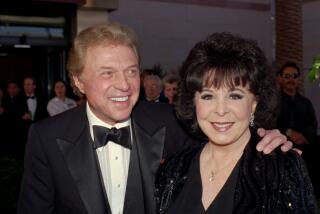Dory Previn dies at 86; Oscar-nominated songwriter
Although she was an Oscar-nominated songwriter, Dory Previn was better known for ballads that spoke to wounded souls. A gifted lyricist, she mined her traumatic childhood and later mental illness to write confessional songs that found an audience — and helped her heal.
In one song, “Beware of Young Girls,” she expressed her outrage over being left in the late 1960s by her husband and songwriting partner, Andre Previn, for actress Mia Farrow:
Beware of young girls
Too often they crave to cry
At a wedding and dance on a grave
Soon after her marriage broke up, Dory Previn had a breakdown. Institutionalized for several months, she “started writing, to get some order out of chaos,” she later said. She emerged with a sheaf of lyrics that marked the start of her solo singing-songwriting career.
Previn died Tuesday at her home in Southfield, Mass., according to her husband, Joby Baker. She was 86.
While a junior lyricist at MGM, she met Andre Previn and they collaborated throughout the 1960s. They received Academy Award nominations for “Faraway Part of Town,” sung by Judy Garland in “Pepe,” and for “Second Chance” from “Two for the Seesaw.”
As their marriage unraveled, the couple did some of their most popular work writing songs for 1967’s “Valley of the Dolls,” a soundtrack that spent six months on the charts.
Her final Oscar nomination came for “Come Saturday Morning,” a melancholy number co-written with composer Fred Karlin for “The Sterile Cuckoo,” a 1969 film with Liza Minnelli.
By then, Dory Previn was largely through with Hollywood, although she won an Emmy in 1983 for co-writing music for the television movie “Two of a Kind” starring George Burns and Robby Benson.
During her hospital stay, she had written candidly of her abusive father and observed what it was like to have a nervous breakdown. When the searingly personal songs were hard to sell, Previn recorded “On My Way to Where,” the first of six albums she released in the 1970s.
The “amazingly revealing song collection has brought her out of the shadows — the shadow of her husband as well as the shadows of her mind,” The Times review said when the album was released.
A follow-up album, “Mythical Kings and Iguanas,” sold well, and another, “Reflections in a Mud Puddle,” made it onto critics’ “best of” lists in 1972.
“What I’ve tried to do,” Previn said in 1971 in Time magazine, “is bring the madness out in the open. Keep it under wraps, and it erupts into wars and violence.”
She was born Dorothy Langan on Oct. 22, 1925, in New Jersey and grew up in Woodbridge, N.J. Her father, Michael Langan, was a raging depressive who refused to acknowledge his paternity.
When Dory was about 10, he barricaded her, along with her mother and infant sister, in the family’s dining room for more than four months. In the song “I Ain’t His Child,” Previn asks:
Anybody I might
Have missed
Would you care to state
That I exist
I ain’t quite sure
What it is
I did
To make him swear
That I ain’t
His kid
A frustrated musician, her father pushed Dory to perform. She was singing in saloons by age 11 and after graduating from high school studied drama in New York.
She was presenting her own songs in small venues when a club manager told her, “Your performance is not so hot — but your material is good,” and then sent samples to MGM producer Arthur Freed, Previn told The Times in 1968.
A reluctant performer, Previn knew her “tiny voice” was limited but good enough to “communicate the ideas of her songs,” she once said.
At MGM, she started out writing lyrics as Dory Langdon and switched to Dory Previn after marrying the composer in 1959.
Her lyrics for the “Theme From Valley of the Dolls” were more personal than most people knew, she told People magazine in 1977. Written when she was “taking a lot of pills,” she started the song by writing:
Gotta get off, gonna get
Have to get off from this ride
Gotta get hold, gonna get
Need to get hold of my pride
Often praised for their craftsmanship and humor, her songs “were too close to the nerve to gain mass public acceptance,” the magazine said.
She went on to write two autobiographies; the play “Mary C. Brown and the Hollywood Sign,” which closed in 1972 after a week of previews at the Shubert Theatre; and the script and music for the 1973 TV movie “The Third Girl From the Left.”
Dory once again collaborated with Andre on “The Magic Number,” a work for orchestra and voice that premiered in 1997 in New York. The two had become friendly after his then-wife asked Dory to be the godmother of their child, Dory told the New York Times in 1997.
Living in a folk-art filled home in the Hollywood Hills in 1977, Previn had essentially given up songwriting when she proclaimed to People: “I’ve had it with angst. I’m now into hope.”
In addition to Baker, a painter she met in the 1970s and married in 1984, Previn is survived by three stepchildren and six stepgrandchildren.
More to Read
Start your day right
Sign up for Essential California for the L.A. Times biggest news, features and recommendations in your inbox six days a week.
You may occasionally receive promotional content from the Los Angeles Times.




















































